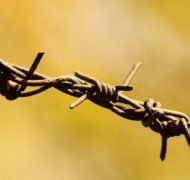Set the Captives Free
Daily Reflection / Produced by The High Calling
Then the Lord told him, “I have certainly seen the oppression of my people in Egypt. I have heard their cries of distress because of their harsh slave drivers. Yes, I am aware of their suffering.”
Exodus 3:7
I’ve had my share of work-related challenges. You have too. Perhaps you’re having difficulty with a boss who yells or belittles. Maybe the new area manager or CEO demands that you give up weekends, or worse yet, vacation time, in the name of profit. These challenges are real and difficult to accept.
Few of us in the west, however, understand the kind of oppression the Israelites endured at the hands of their Egyptian taskmasters. The horrors of their daily work were unlike anything most of us will ever see.
The Hebrew word used for oppression is oniy, which means poverty, misery, trouble, and depression, and the word itself comes from another Hebrew word, anah. Anah carries the idea of brow beating, using excessive force, to humiliate, look down upon, and to weaken.
Lately, I’ve been wondering if this isn’t the same kind of oppression experienced by nearly half-million children working in slavery in the cocoa industry.
When faced with the enormity of the problem, it’s tempting to throw our hands up in the air and admit defeat. We unwrap thin foil and savor sweet bits of chocolate in an effort to console ourselves.
Not my friend Kelli. She loves a good chocolate fix like the next person and considers it a great day when she’s baked cupcakes with her daughters.
This winter, after becoming aware of widespread human trafficking in the cocoa industry, she decided to do something.
On a Saturday afternoon, she and her daughters hosted a chocolate tasting party where they viewed a documentary highlighting the plight of young boys and girls forced to work in Ivory Coast cocoa farms.
Today, Kelli and her family only purchase chocolate made without the use of slave labor. Chips, cocoa powder, and candy bars are rich with the taste of freedom.
A taste, Kelli says, was never so sweet!
QUESTIONS FOR FURTHER REFLECTION: What did God do when he saw the oppression of the Israelites? Does God care about those who are oppressed today? How might your buying choices impact the lives of others? Could God be calling you to bring his children out of slavery?
PRAYER: O God, thank you for hearing our groanings, for seeing us in our misery. Thank you for also being a God who acts, especially on behalf of those who cannot help themselves.
Forgive us for the times we’ve turned a blind eye to the oppression of children around the world. Show us tangible ways we can contribute to freedom, rather than to oppression.
We also pray, O Lord, for you to act mightily. Set the captives free. Bring these children up from that land to a good and large land, to a land flowing with milk and honey. Amen.
______________________________
Social Justice at Work
When God asks us to take care of the orphan, widow, and the poor, what does that mean for our workplaces? How do we follow a social justice mandate in our offices, schools, warehouses and retail establishments? And how does it change our world when social justice works the way God intended?
In the series Social Justice at Work, The High Calling explores social justice in the places we work and the ways we work. Join us as we discuss how our calling to the "least of these" affects us outwardly in our jobs, and inwardly as we perform our jobs, via theme-related Bible reflections, featured articles, and discussion starters. We encourage you to add your questions, concerns and comments, engage with us on social media (especially Twitter and Facebook), and invite your friends and colleagues to do the same.
Featured image above by Nicu Buculei. Used with Permission. Via Flickr.






